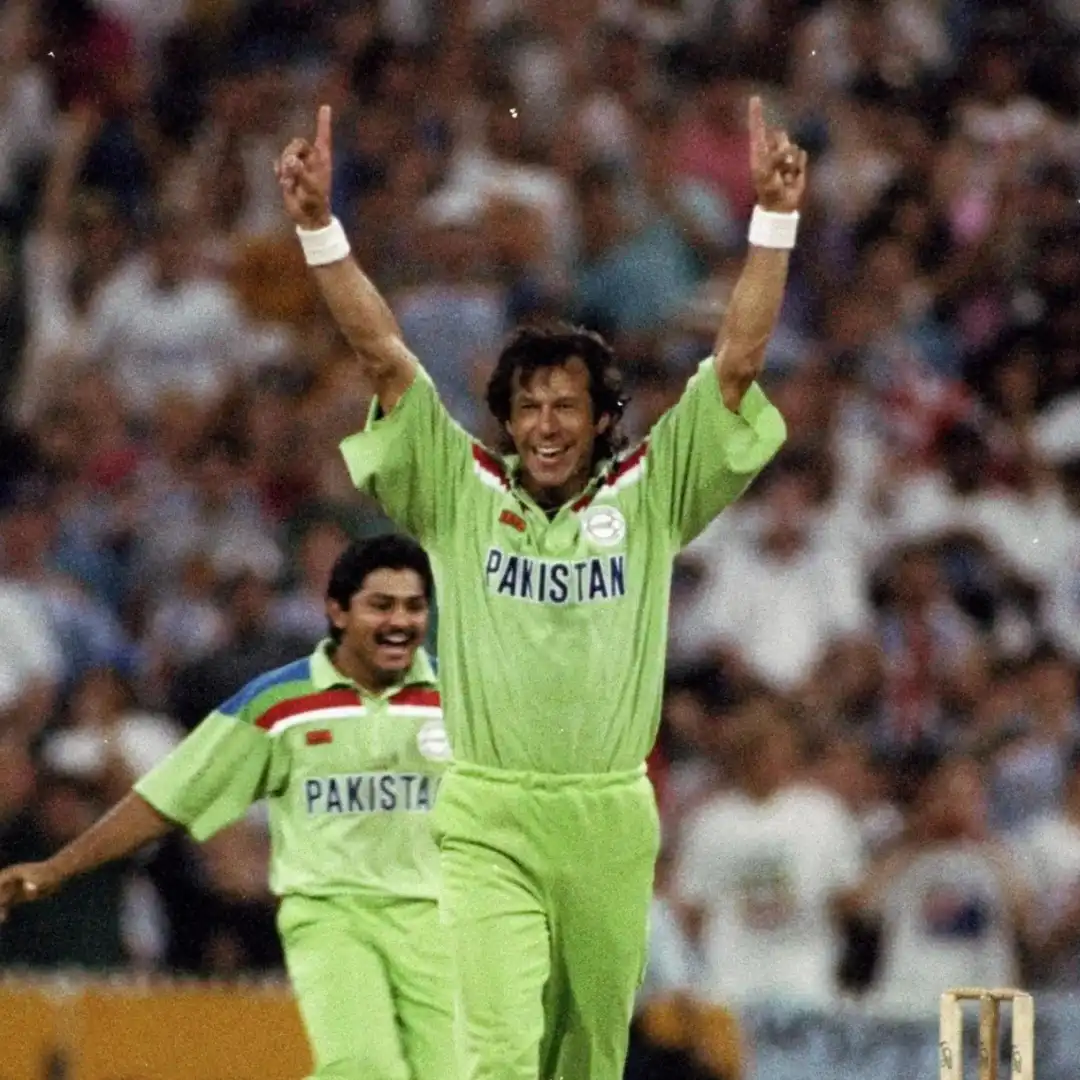

The Great Leader: Imran Khan’s Cricket Legacy
The cricketing world has been graced by exceptional individuals who have made immense contributions to their sport and their countries. When discussing this topic, any cricket fan would undoubtedly mention legendary names such as Sir Viv Richards, Don Bradman, Sachin Tendulkar, Ian Botham, Garfield Sobers, Ricky Ponting, Jacques Kallis, and the greatest of them all, Imran Khan.
Imran, the cricketer-turned-politician, is celebrating his 69th birthday today amidst joyous celebrations across the cricketing globe. Fans from all eras, including the current generation, are expressing their well-wishes for the Pakistani captain-turned-Prime Minister on social media, with the hashtag #ImranKhan trending.
Leading a developing country like Pakistan is a challenging task, and it was no different for Imran when he led the national cricket team in 1992. From captaining the team to victory in the 1992 World Cup to assuming leadership of the nation, Imran has embarked on an incredible journey filled with notable obstacles. He has proven that success is not attained overnight. Since becoming the Prime Minister of Pakistan, he has not only achieved success on the cricket field but has also won the hearts of millions by striving to bring about positive change in the face of enduring hardships and longstanding issues.
Imran Khan’s Formative Years
Khan was born in Lahore on 5 October 1952, although some reports suggest a different date as there was a mistake on his passport stating the wrong date. He grew up in a well-off family with four sisters. His father was a civil engineer, and his mother belonged to the Burki tribe, an ethnic Pashtun group. Khan’s family has a cricketing background, with his cousins Javed Burki and Majid Khan representing Pakistan. He is also a descendant of Pir Roshan, the Sufi warrior-poet and inventor of the Pashto alphabet.
In his youth, Khan was a quiet and shy boy. He received a privileged education, attending prestigious schools like Aitchison College, Cathedral School in Lahore, and the Royal Grammar School Worcester in England. He excelled at cricket, and in 1972, he went on to study Philosophy, Politics, and Economics at Keble College, Oxford.
Khan made his debut in cricket at the age of 16 in Lahore. He played for various teams, including Lahore A, Lahore B, and Lahore Greens. He also represented the University of Oxford’s Blues Cricket team. Khan played county cricket in England for Worcestershire and later played for Dawood Industries, Pakistan International Airlines, and Sussex.
His Test cricket debut was against England in June 1971, and he played his first One Day International (ODI) match against England in August 1974. After completing his studies and county cricket, he joined the Pakistan national team permanently from the 1976-1977 season. Khan’s reputation as one of the fastest bowlers grew, and he was known for his role in popularizing the reverse swing bowling technique. He also had an impressive bowling average and strike rate.
Khan achieved the all-rounder’s triple, scoring 3000 runs and taking 300 wickets, in 75 Tests, making him the second-fastest player to reach this milestone after Ian Botham. He had a remarkable batting average of 61.86, the second-highest for a Test batsman playing at position 6. He retired from cricket after the 1992 World Cup, ending his career with notable records in both Test matches and ODIs.

Imran Khan’s Captaincy Through the Years
In 1982, Imran Khan, at the age of thirty, reached the pinnacle of his cricket career when he was appointed as the captain of the Pakistan cricket team, taking over from Javed Miandad. Khan’s leadership skills were immediately put to the test as he led the team in 48 Test matches, resulting in 14 victories, 8 defeats, and 26 draws. He also played 139 ODIs, winning 77, losing 57, and tying one.
Under Khan’s captaincy, the Pakistani team achieved a significant milestone by securing their first Test victory on English soil in 28 years. This historic triumph took place at Lord’s during their second match, and it highlighted Khan’s exceptional abilities as both a fast bowler and an all-rounder. During the 1981-1982 season, Khan achieved his personal best Test bowling performance by taking an impressive 8 wickets for 58 runs against Sri Lanka. His exceptional performance continued during a three-Test series against England in 1982, where he excelled in both bowling, taking 21 wickets, and batting, averaging 56. Later that year, in a home series against India, Khan demonstrated his prowess by claiming 40 wickets in six Tests at an average of 13.95. As captain, Khan took 88 wickets in 13 Test matches in a single year, a remarkable achievement.
However, the series against India took a toll on Khan’s physical well-being. He suffered a stress fracture in his shin, which forced him to take a hiatus from cricket for over two years. With the support of an experimental treatment funded by the Pakistani government, Khan recovered by the end of 1984 and successfully made his comeback in the latter part of the 1984-1985 season.
In 1987, Khan led the Pakistan team to their first-ever Test series win in India, followed by another historic series victory in England. Throughout the 1980s, his team showcased their strength by securing commendable draws against the formidable West Indies. In 1987, both India and Pakistan jointly hosted the Cricket World Cup, but unfortunately, neither team advanced beyond the semi-finals. It was after this tournament that Khan decided to retire from international cricket. However, in 1988, he received a special request from the President of Pakistan, General Zia-Ul-Haq, asking him to return as captain. On January 18, Khan announced his decision to rejoin the team, and he immediately made an impact. Khan led Pakistan to a successful tour in the West Indies, which he considers as the last time he truly excelled in bowling. His outstanding performance earned him the prestigious Man of the Series title, with an impressive haul of 23 wickets in three Tests against the West Indies.
Undoubtedly, Khan’s most remarkable achievement as a captain and cricketer came in the 1992 Cricket World Cup. Despite Pakistan having a fragile batting lineup, Khan promoted himself as a batsman in the top order alongside Javed Miandad. Although his contributions as a bowler were limited, at the age of 39, Khan secured the World Cup victory for Pakistan by taking the winning wicket himself. This momentous occasion marked the culmination of Khan’s illustrious cricketing career, leaving a lasting legacy in the annals of Pakistan’s cricket history.
Imran Khan’s journey as a cricketer, captain, and leader remains an inspiration to aspiring athletes and fans worldwide. His unwavering determination, exceptional skills, and remarkable achievements have solidified his status as one of the greatest cricketing legends of all time.
Beyond the Pitch
Beyond his personal achievements, Imran Khan’s influence extended beyond the boundaries of the cricket field. He played a pivotal role in shaping the future of Pakistani cricket by nurturing young talent and promoting a culture of discipline, dedication, and professionalism within the team. His commitment to the game and his insistence on playing with integrity and sportsmanship set an example for generations of cricketers to come.
Khan’s cricketing journey was not without its fair share of challenges and setbacks. Injuries plagued him throughout his career, forcing him to endure long periods of rehabilitation and recovery. However, his resilience and determination propelled him forward, and he emerged stronger each time.
After retiring from cricket in 1992, Khan transitioned into a new phase of his life, focusing on philanthropic efforts and eventually entering the realm of politics. While his political career lies outside the scope of this discussion, it is important to acknowledge that his cricketing journey laid the foundation for his future endeavors and shaped the man he would become.
Imran Khan’s cricketing journey remains a testament to the power of perseverance, talent, and leadership. His achievements on the field continue to inspire and captivate cricket enthusiasts around the world. From his graceful bowling action to his elegant stroke play, Khan’s contributions to the game are etched in the annals of cricketing history.
As we reflect upon Imran Khan’s cricketing journey, we are reminded of the impact that one individual can have on a sport. His dedication, skill, and unwavering belief in his abilities propelled him to great heights, making him a true icon of the game. Imran Khan’s legacy extends far beyond statistics and records; it lies in the inspiration he provides to aspiring cricketers, the memories he created for fans worldwide, and the indomitable spirit he displayed every time he stepped onto the field.

Latest News
The Great Leader: Imran Khan’s Cricket Legacy
Moeen Ali’s Ashes Finale Groin Injury
Brook Misses Ton as Australia Rules Fifth Ashes Test
Pakistan Defeats Sri Lanka To Clinch Test Series 2-0
India Downs West Indies in the First ODI
– Advertisement –
– Advertisement –
– Advertisement –
– Advertisement –
– Advertisement –